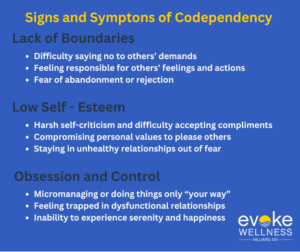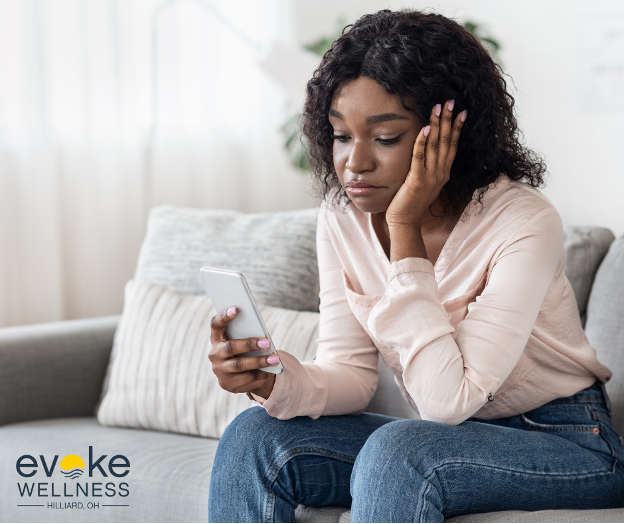You’ve likely heard the term “codependent” used to describe unhealthy relationships. But what does it really mean to be codependent? In this article, we’ll explore the telltale signs of codependency, the roots of codependent behavior, and most importantly, the steps you can take to break free from codependency and reclaim your sense of self. Recovery is possible through implementing boundaries, self-care, and addressing underlying issues with a professional’s guidance. As you read, reflect on your own tendencies and relationships to determine if codependency has infringed on your well-being. With compassionate understanding and gradual change, you can move forward in a healthier direction.
Call us at (833) 949-1347 today or reach out online.
What Is Codependency?
Codependency refers to an excessive reliance on others for approval and a sense of identity.
An Unhealthy Coping Mechanism
- It often stems from low self-esteem and insecurity
- People develop codependent behaviors to gain control over feelings of shame or rejection
Signs You May Be Codependent
- Having difficulty saying “no” or expressing true feelings
- Putting others’ needs before your own to an unhealthy degree
- Staying in unhealthy relationships out of obligation
Breaking the Cycle
Recovering from codependency involves building healthier coping skills, boundaries, and self-esteem. Counseling can provide tools to overcome codependent behaviors and develop a stronger sense of self-worth.
Signs and Symptoms of Codependency

By recognizing these patterns, you can start addressing underlying codependent behaviors. Moving forward takes courage, self-awareness and support.
Causes and Risk Factors for Codependency
Dysfunctional Family Dynamics
- Codependency often stems from unhealthy family patterns like addiction, abuse, or emotional neglect.
- Growing up in an environment lacking clear boundaries or role models for healthy relationships.
Low Self-Esteem & Insecurity
- Having poor self-worth makes you more prone to seeking validation through unhealthy means.
- Fear of abandonment fuels codependent behaviors aimed at keeping others close.
Lack of Independence
- Having an excessive reliance on others for approval, identity, or self-worth.
- Difficulty making decisions or functioning autonomously.
Trauma History
- Childhood trauma like abuse or loss can instill codependent tendencies.
- PTSD, anxiety, depression increase susceptibility.
How Codependency Can Lead to Addiction
Relying on Others for Validation
You look to others to define your self-worth. This leaves you vulnerable to addiction as a coping mechanism.
Lack of Boundaries
Poor personal boundaries allow addictive behaviors to go unchecked. You struggle to say no to unhealthy requests.
Fear of Abandonment
You stay in toxic relationships to avoid being alone. Addiction numbs the pain of these dysfunctional bonds.
Seeking Treatment for Codependency and Addiction
Inpatient Rehabilitation
- Comprehensive programs
- 24/7 medical supervision
- Counseling and therapy
Outpatient Programs
- Flexible scheduling
- Counseling and group sessions
- Continue living at home
Support Groups
- Share experiences
- Learn coping strategies
- Build a supportive network
Seeking professional help is crucial for overcoming codependency and addiction. Inpatient rehabilitation offers immersive treatment, while outpatient programs allow more flexibility. Support groups provide a sense of community, fostering healing and personal growth.
Intensive Inpatient Treatment for Codependency and Addiction
Intensive inpatient treatment provides a sanctuary where you can heal from codependency and addiction simultaneously. This immersive approach removes external triggers and stressors, allowing you to focus entirely on recovery.
Tailored Therapy Programs
- Evidence-based therapies like CBT and DBT
- Individual, group, and family counseling sessions
- Holistic activities for mind-body healing
24/7 Medical Supervision
- Managed detox and withdrawal support
- Medication management as needed
- Regular monitoring by clinical staff
Structured Daily Routines
Inpatient stays follow a schedule that balances therapies, meals, recreation, and personal time. This routine instills healthy coping mechanisms and self-care practices to prevent relapse.
Steps to Heal From Codependency
Seek Professional Help
- Consult a therapist or counselor specializing in codependency
- Join a support group for codependents
- Learn coping strategies and communication skills
Build Self-Awareness
- Identify unhealthy patterns and triggers
- Practice self-reflection and mindfulness
- Develop self-validation and self-care habits
Set Healthy Boundaries
- Say no without guilt or over-explaining
- Avoid caretaking or enabling behaviors
- Prioritize your needs and wants
Foster Positive Relationships
- Surround yourself with supportive loved ones
- Cultivate mutual respect and equality
- Communicate openly and assertively
The path to healing codependency requires patience, self-compassion, and commitment to personal growth. With professional guidance and inner work, you can break free from codependent patterns.
Tips for Recovering From Codependency
Seek Professional Help
- Work with a therapist specializing in codependency recovery
- Join a support group to share experiences and coping strategies
Build Self-Awareness
- Identify unhealthy patterns and codependent behaviors
- Practice mindfulness to stay present and aware
Set Healthy Boundaries
- Learn to say no without guilt or anxiety
- Prioritize your needs over others’ wants
Develop Healthy Relationships
- Cultivate interdependent relationships based on mutual respect
- Surround yourself with supportive loved ones
Boost Self-Esteem
- Engage in self-care activities that nurture your mind and body
- Challenge negative self-talk with positive affirmations
FAQ: What Is the Best Inpatient Rehab for Codependency and Addiction?
Personalized Treatment Plans
- Comprehensive assessments identify underlying issues
- Customized programs target codependency and addiction simultaneously
- Multidisciplinary team provides holistic care
Evidence-Based Therapies
- Cognitive-behavioral therapy reshapes unhealthy thinking patterns
- Dialectical behavior therapy builds emotional regulation skills
- Family therapy heals relationship dynamics
Dual Diagnosis Support
- Co-occurring mental health disorders are common
- Integrated treatment enhances recovery outcomes
- Medications may be utilized when appropriate
Structured Environment
- Removal from toxic situations allows healing to begin
- 24/7 monitoring ensures safety and accountability
- Daily scheduling instills healthy routines
The ideal inpatient rehab provides an immersive healing experience. A compassionate setting, personalized care, and evidence-based approaches set the stage for lasting recovery.
Conclusion
You now have the tools to begin your journey of healing and recovery from codependency. With dedication to self-care, boundary setting, and seeking support, you can gradually break free from unhealthy relationship patterns. This process takes time, courage, and compassion. Believe in your inner strength, take things one day at a time, and don’t be afraid to ask for help when you need it. You deserve to have healthy, fulfilling relationships. By making the choice today to walk this path, you’re taking the first step toward the joy and peace you seek. Your bright future starts now.
Begin Your Journey with Evoke Wellness at Hilliard
If you or a loved one is considering treatment, Evoke Wellness at Hilliard invites you to contact us. Our compassionate team is ready to answer your questions, discuss your needs, and help you take the first steps toward recovery. In Hilliard, you’ll find more than just a treatment program – you’ll discover a community dedicated to your wellness and success. Together, let’s embrace the journey to recovery and the promise of a new beginning. Call us at (833) 949-1347 today or reach out online.



